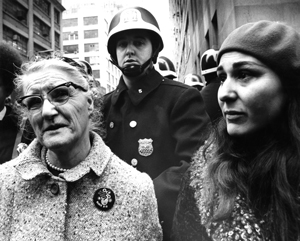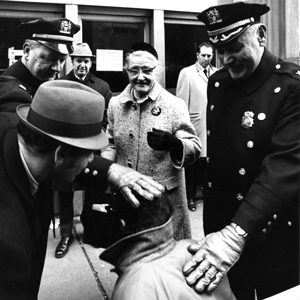 |
|
|
Anne McGrew Bennett outside Offices of Draft Boards 1-4 in New York City, 1970 |
|
 |
Day of "Civil Obedience" 1970
I, Anne M. Bennett, resident of New York City, aged 66, arrested and charged with "disorderly conduct." There were some 181 other adults so charged and 15 minors released without charge. How do such things come to happen? What do they mean?
A little before 7:30 that morning several hundred New Yorkers went to the Varick Street building housing the offices of Draft Boards 1-4, N.Y.C. I did not go to be arrested. I went to engage in substantive "dialogue" with persons employed by the federal government in the draft board offices. This was part of the Anti-Draft Week's national program of groups opposing the war in Vietnam.
When we got to the Varick Street building there were police barricades in front of the building and many, many police. This did not surprise me. The anti-draft action had been well publicized. Even the sign on the door "closed to the public" was not too surprising for the news media had carried reports the night before of California Draft Boards closed and there were rumors that all Boards would be closed. However, I am a citizen and so, under the First Amendment I feel that I had a civil right t o seek an audience in the local office of the Federal Selective Service both to get information concerning the work of the draft board and to "petition for redress of grievance." I always expect my government to respect and honor, not only the rights, but the obligations of citizens to participate fully as responsible members of the Republic.
The New York City police were unable to answer our inquiries as to whether the Draft Board offices were completely closed or if they were open for employees to work but closed to us, i.e., the public. The police sergeant agreed to see if one person, accompanied by a policeman, from the 500 or so persons who were picketing peacefully and orderly would be permitted to enter the building, to go to the Draft Board offices to see if they were open; and if open to present a request for small grougs, eight or ten each, to be allowed in the offices to talk with the Board employees. I was asked by the co-ordinating group if I would be that "one person." I agreed but requested that a lawyer from the A.C.L.U. be permitted to go with me. The police made the request and it was granted by the office manager of the Board.
To continue the story go to Day of "Civil Obedience".
This is one of the documents in the Anne McGrew Bennett (1903-1986) Collection. The materials include her efforts for peace during the Vietnam conflict, papers of the Jeanette Rankin Brigade (1967-1968), and writings related to women's rights, women's ordination and inclusive language.
Bennett was a "feminist theological pioneer" who insisted on women's equality within the ecumenical church. An inspiration for feminists and feminist theologians in the sixties and seventies, she is one of the oldest women included in Barbara Love's Feminists Who Changed America, 1963-1975. She served on the board of the Office of Women's Affairs at the GTU. Her husband, John C. Bennett (1903 - 1995) was a Christian ethicist, professor and president of Union Theological Seminary in New York from 1963 to 1970.
For more information, contact Special Collections at 510/649-2523 or archives@gtu.edu.
